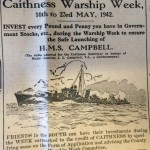This week the American and Japanese navies fought the Battle of the Coral Sea, the first battle fought entirely between aircraft carriers; the Japanese won the battle and sank the USS Lexington, but sustained heavy losses and subsequently abandoned plans to invade New Guinea. Also this week British forces took Madagascar from the Vichy French and on 6 May the last American forces on the Philippines finally surrendered on Corregidor.
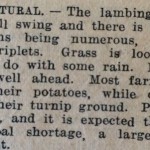
In Caithness, the spring planting and lambing season was well underway. The John O’Groat Journal reported for Dunbeath that “Grass is looking well, but could do with some rain. Land work is going well ahead. Most farmers have planted their potatoes, while others are dressing their turnip ground. Peat cutting has begun.”
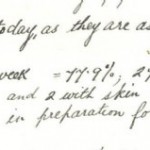
This of course had a knock-on effect on rural school attendances. The Head Teacher of Stemster School in Bower recorded in the log book for 7 May: “4 boys absent today as they are assisting at home with farm-work.” Helping on the farm wasn’t the only reason for absence, though: next day’s entry reads, “2 pupils still absent with whooping cough, and 2 with skin trouble.”
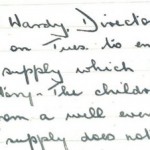
Meanwhile Bilbster School near Wick was having trouble of a different kind. On 11 May the log book records: “Mr McHardy, Director [of Education], visited the school on Tuesday to enquire about the water supply which has never been satisfactory. The children carry drinking water from a well every day as the school supply does not appear usable.”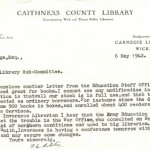
Dr Robertson, the Wick Librarian, was becoming exercised over the question of books for soldiers. The War Office wanted additional books to be provided for service personnel, whereas in the smaller libraries of Caithness “all our stock is in full use, and … the Services are being treated as ordinary borrowers”. As Dr Robertson pointed out, “the trouble is the War Office, who consulted an English librarian quite ignorant of our northern conditions and used to big libraries.”
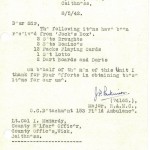 The Armed Services collected games and leisure equipment so their members could entertain themselves, known as “Jock’s Box”. An idea of what they contained is shown in a letter from the Royal Army Medical Corps stationed at Lybster, acknowledging receipt of 2 sets draughts; 2 sets dominoes; 12 packs playing cards; 1 set Lotto; 2 dart boards and darts.
The Armed Services collected games and leisure equipment so their members could entertain themselves, known as “Jock’s Box”. An idea of what they contained is shown in a letter from the Royal Army Medical Corps stationed at Lybster, acknowledging receipt of 2 sets draughts; 2 sets dominoes; 12 packs playing cards; 1 set Lotto; 2 dart boards and darts.
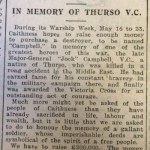
Finally this week, after it success in raising funds for a “Caithness” Spitfire, the county was gearing up for Warship Week later in the month. The target was to raise £200,000 “to purchase a destroyer, to be named ‘Campbell’ in memory of one of the greatest heroes of this war, the late Major-General “Jock” Campbell, VC who was killed in a road accident in the Middle East.” As the advertisement said, “Invest every Pound and Penny you have in Government Stocks, etc., during the Warship Week to ensure the safe launching of H.M.S. Campbell.”